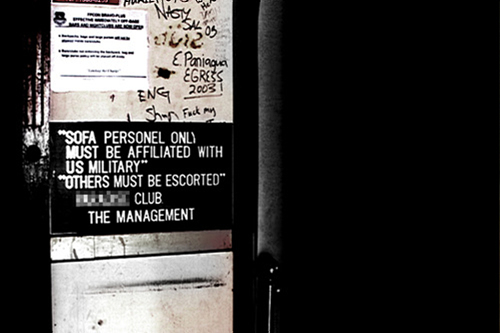7th(2005)
Mamasang: Remember Me This Way
‘pinks’ - Collective for Sexually Minor Cultures
- Korea
- 2005
- 65min
- DV6mmdigital, DV
- color
SYNOPSIS
The base towns that cater to US military servicemen in Korea (Gijichon) also serve as hubs of licensed prostitution. One summer, the large base town Songtan is overrun by demonstrations urging the reduction of armaments and withdrawal of US forces from Korea. But as the local economy depends on the income generated by prostitution, the townspeople look unfavorably upon the demonstrators.
While US air force planes roar over the town, the documentary crews meet ‘Aunt Yanghee’. Often involved in the Gijichon sex trade since an early age, these ‘Mamasangs’ work as a go-between for the club owners and women working at the clubs. If a customer wants to take a woman out, the ‘Mamasang’ handles the transaction. Now, however, ‘Aunt Yanghee’ experiences confusing and complicated emotions about the immigrant women from the Philippines and Russia who have replaced Korean women in the clubs. Due to societal discrimination against people with mixed parentage, ‘Aunt Yanghee’ has no other choice but to contribute to her family’s support. Her poverty-stricken life and a pill dependency is further aggravated by her friend’s sudden death.
Mamasang: Remember Me This Way, through the inclusion of the voices of real women met on the streets of Songtan, succeeds in revealing the reality of a base town and as a portrait of Korean society at large. (Nam In-young)
While US air force planes roar over the town, the documentary crews meet ‘Aunt Yanghee’. Often involved in the Gijichon sex trade since an early age, these ‘Mamasangs’ work as a go-between for the club owners and women working at the clubs. If a customer wants to take a woman out, the ‘Mamasang’ handles the transaction. Now, however, ‘Aunt Yanghee’ experiences confusing and complicated emotions about the immigrant women from the Philippines and Russia who have replaced Korean women in the clubs. Due to societal discrimination against people with mixed parentage, ‘Aunt Yanghee’ has no other choice but to contribute to her family’s support. Her poverty-stricken life and a pill dependency is further aggravated by her friend’s sudden death.
Mamasang: Remember Me This Way, through the inclusion of the voices of real women met on the streets of Songtan, succeeds in revealing the reality of a base town and as a portrait of Korean society at large. (Nam In-young)
PROGRAM NOTE
The base towns that cater to US military servicemen in Korea (Gijichon) also serve as hubs of licensed prostitution. One summer, the large base town Songtan is overrun by demonstrations urging the reduction of armaments and withdrawal of US forces from Korea. But as the local economy depends on the income generated by prostitution, the townspeople look unfavorably upon the demonstrators.
While US air force planes roar over the town, the documentary crews meet ‘Aunt Yanghee’. Often involved in the Gijichon sex trade since an early age, these ‘Mamasangs’ work as a go-between for the club owners and women working at the clubs. If a customer wants to take a woman out, the ‘Mamasang’ handles the transaction. Now, however, ‘Aunt Yanghee’ experiences confusing and complicated emotions about the immigrant women from the Philippines and Russia who have replaced Korean women in the clubs. Due to societal discrimination against people with mixed parentage, ‘Aunt Yanghee’ has no other choice but to contribute to her family’s support. Her poverty-stricken life and a pill dependency is further aggravated by her friend’s sudden death.
Mamasang: Remember Me This Way, through the inclusion of the voices of real women met on the streets of Songtan, succeeds in revealing the reality of a base town and as a portrait of Korean society at large. (Nam In-young)
While US air force planes roar over the town, the documentary crews meet ‘Aunt Yanghee’. Often involved in the Gijichon sex trade since an early age, these ‘Mamasangs’ work as a go-between for the club owners and women working at the clubs. If a customer wants to take a woman out, the ‘Mamasang’ handles the transaction. Now, however, ‘Aunt Yanghee’ experiences confusing and complicated emotions about the immigrant women from the Philippines and Russia who have replaced Korean women in the clubs. Due to societal discrimination against people with mixed parentage, ‘Aunt Yanghee’ has no other choice but to contribute to her family’s support. Her poverty-stricken life and a pill dependency is further aggravated by her friend’s sudden death.
Mamasang: Remember Me This Way, through the inclusion of the voices of real women met on the streets of Songtan, succeeds in revealing the reality of a base town and as a portrait of Korean society at large. (Nam In-young)
Director
-

‘pinks’ - Collective for Sexually Minor Cultures‘pinks’ - Collective for Sexually Minor Cultures
The ‘pinks’ is a feminist/cultural activist organization dedicated to changing the daily experience of and sexual sensibilities toward feminist life. As a part of their feminist cultural activism, the ‘pinks’ produced the documentary Mamasang: Remember Me This Way. This film, intended to contribute to the resolution of the issue of sex trafficking in women, is the ‘pinks’ first project.
Credit
- ProducerAhn Jihye 안지혜
- Cinematography Kim Il-rhan 김일란, Ahn Jihye 안지혜, Hyuk-sang De
- Editor Ahn Jihye 안지혜, Hyuk-sang Denis Lee 이혁상
- Music Choi Eui-kyoung 최의경
- Sound Sung Ji-young 성지영






